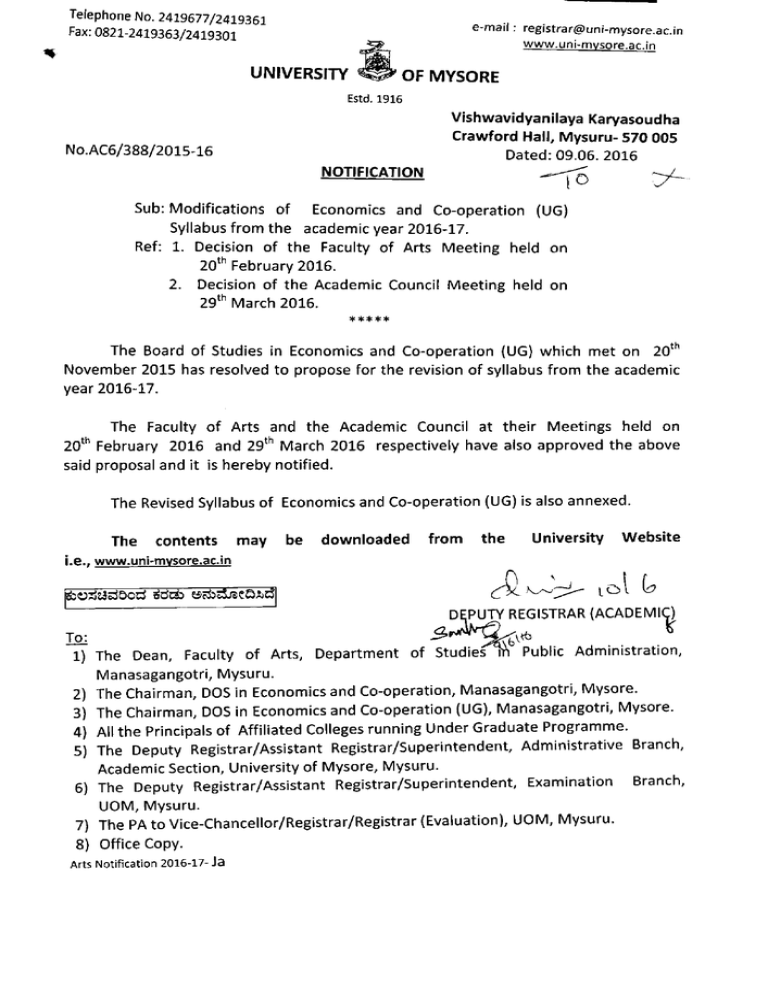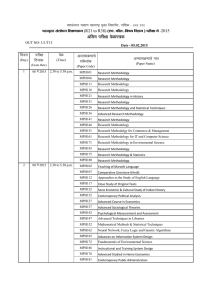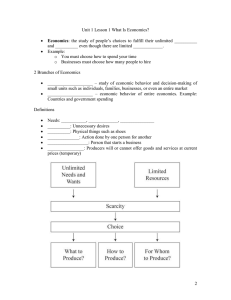Economics
advertisement

Modified Syllabus for B.A. (2010-11) B.A. Economics Semester Scheme (Revised Syllabus 2010-1 1) Paper No 1 Paper code Core-1 I Principles of Micro Economics No. Teaching Hours per week 6 Hours Semester Title of the paper 2 Core-2 II Principles of Macro Economics 6 Hours 3 Core-3 III Mathematics and Statistics for Economics 6Hours 4 Core 4 IV Indian Economy 6 Hours V Semester 5 Core 5 V Managerial Economics 3 Hours 6 Core-6 V Economics of Development 3 Hours Elec-7:1 V Agricultural Economics 3 Hours Elec-7.2 V Industrial Economics 3 Hours Elec-7.3 V Banking Theory and Policy 3 Hours Elec-7.4 V Natural Resource Economics 3 Hours Elec-7.5 V Human Development 3 Hours Elec-7.6 V Regional Economics 3 Hours Elec-7.7 V History of Economic Thought 3 Hours Elec-7.8 V Introduction to Econometrics 3 Hours Elec-7.9 V Fundamentals of Computers 3 Hours Elec-7.10 V Introduction to Tourism Economics (Part I) 3 Hours Electives* 7 VI Semester 8 Core-8 VI Public Finance 3 Hours 9 Core-9 VI International Economics 3 Hours Electives* 10 Elec-10.1 VI Rural Development 3 Hours Elec-10.2 VI Labour Economics 3 Hours Elec-10.3 VI Indian Financial System 3 Hours Elec-10.4 VI Environmental Economics 3 Hours Elec-10.5 VI Gender Economics 3 Hours Elec-10.6 VI Urban Economics 3 Hours Elec-10.7 VI Indian Economic Thought 3 Hours Elec-10.8 VI Basic Econometrics 3 Hours Elec-10.9 VI Computer Application to Economics 3 Hours Elec-10.10 VI Tourism Economics- Macro Aspects- 3 Hours B.A. Economics (Revised) IV – Semester Paper-4 (Core-4) (6hrs of Teaching per week) INDIAN ECONOMY Module 1 : Structure of the Indian Economy Natural, Human Resources and economic development: size and growth rate of population in Indian- population explosion – population policy. National Income of India – National Income estimates in India – Trends in National Income – Growth and structure – Estimation of National Income - Limitations of National Income – Inequalities of Income in India. Module 2 : Agriculture Sector in India The place of Agriculture in the National Economy since 1991 – Crop pattern in India – National Agriculture Policy – Food security in India – Irrigation and agricultural inputs – agricultural labour – progress of agriculture under the plans. Module 3 : Indian Industries Importance of Industrialization – Industrial policy since 1991 – Problems of large scale Industries – Role and Problems of small scale industries – Disinvestment – policies and issues, Emergence of IT Industry. Module 4 : The Tertiary sector in India Foreign Trade of India : Composition of India’s foreign trade – Direction of Indian’s foreign trade – Indian’s balance of payments – Impact of WTO on India’s foreign trade – India’s foreign exchange reserves. The reserve bank of India its functions and Monetary management – reforms in the banking sector. Module 5: (a) Indian Fiscal System Revenue and Expenditure of the central and state governments – public debt management – Financial relations between center and state Parallel economy. (b) Challenges to development Poverty : Poverty eradication programmes in India Unemployment in India, schemes to reduce unemployment. Reference: 1. Dutt Ruddar and Sundaram K.P.M (2007) Indian Economy, S.Chand and Co New Delhi. 2. Misra S.K and V.K Puri (2007) Indian Economy, Himalaya Publishing House, Mumbai. Agarwal A.N (2007) Indian Economy – Problems of development and Planning Wishwa Prakashan, New Delhi B.A. Economics VI – Semester Paper – 8 [Core 8] (3hrs of Teaching per week) PUBLIC FINANCE Module 1 : Introduction Nature, Scope and Importance of Public finance – Public Finance vs Private Finance – Importance of the study of public Finance – Role of Public Finance in Developing Countries. Module 2 : Principles of Public Economics Principle of Maximum Social Advantage – Principle of Allocation of Resources – Test of Social advantage – welfare Foundations of Public Finance – Social Welfare Functions of modern Government – Distinction between private Goods and public Goods – Market Failures – market Imperfections – Externalities. Module 3 : Public Expenditure, Public Revenue and Public Debt Principle of public Expenditure – Wagner’s Law of increasing State Activities, Hypothesis – Kinds of public Expenditure and Canons of Expenditure, Sources of public Revenue – Tax Revenue and Non Tax Revenue – Types – Direct and Indirect Taxation – Characteristics of a Good Tax System, Meaning of public Debt – Causes – Limits to raising public debt – burden of Debt – Debt Redemption Deficit Financing – Meaning – Techniques of Deficit Financing – Objectives of Deficit Financing Module 4 : The public Budget Classification of budgets Programme and Performance Budget – Budgetary Deficits – Primary, Revenue and Fiscal Deficits – Zero base budgeting Module 5 : Fiscal Policy Objectives of Fiscal Policy – Role of Fiscal Policy in Economic Development. References 1. Musgrave R.A and Musgrave – Public Finance in theory and Pratice 2. Ulbrich Holley (2003) Public Finance in Theory and Practice, Thomson SouthWestern, USA 3. Bhatia H.L (2004) Public Finance, Vikas Publishing House Pvt Ltd, New Delhi 4. Sundaram K.P.M and K.K.Andley (2003) Public Finance S Chand & Co Ltd ,New Delhi 5. Singh S.K. (2001) Public Finance in Theory and Pratice S.Chand and Co Ltd 6. Agarwal R.C (2004) Public Finance Theory and Practice Educational Publishers Agra B.A. Economics VI – Semester Paper –9 [Core 9] (3hrs of Teaching per week) INTERNATIONAL ECONOMICS Module 1 : Introduction and Theories of International Trade Importance of International Economics – Distinction between Internal and International Trade – Need for the study, Theories of Absolute cost advantage and Comparative Cost – Heckscherohlin Theory – leontief Paradox Module 2 : Terms of Trade Various concepts of terms of trade – Concept of reciprocal Demand – Factors Affecting Terms of Trade – Deterioration in Terms of trade – Gains from Trade Module 3 : Trade and Commercial Policy Free Trade vs Protectionist Policy – Relative Merits and Demerits – Tariffs : Types and Effects of Tariffs – Quotas : Its Effects on trade – Role of Multinational Corporations – Trade Liberalization – World Trade Organization (WTO) and its Functions. Module 4 : Balance of Payment and Foreign Exchange Concepts of Balance of Trade and Balance of Payments – Disequilibrium in the Balance of payments – Various measures to correct disequilibrium in the balance of payments. Merits and Demerits of Devaluation, Foreign Exchange Rate – Meaning and Determination. International Financial Institution and Eco Co-Operation – Functions of International Monetary Fund(IMF) and International Bank for Reconstruction and Development (IBRD) Module 5 : International Economic and monetary Co-Operation New International Economic Order (NIEO) – Economic Co-Operation among Developing Countries – South Asian Association for Regional Co-Operation (SAARC) References 1. Salvatore Dominick (2005) International Economics, John Wiley & Sons, Inc 2. Mithani D.M (2003) International Economics, Himalaya Publishing House, Mumbai 3. Mannur H.G (2003) International Economics Vikas publishing House Pvt Ltd, New Delhi B.A. Economics VI – Semester Paper-10 [Elective 10:1] (3hrs of Teaching per week) RURAL DEVELOPMENT Module 1 : Introduction to Rural Development Definitions – Objectives and Importance of the Study of Rural development – Characteristics of Rural Economy, Society and Polity, Need for Rural Development. Module 2 : Approaches to Rural Development Gandhian Approach – Sectoral approach – Cluster approach – Service area approach – Integrated approach – Participatory approach Module 3 : Rural development Programmes Dimensions of Rural Unemployment and Poverty – A brief review of the current rural development programes for poverty alleviation – Rural infrastructure (Economic and Social) Programmes – Gender Bias in Rural development. Module 4 : Rural Industrialization Growth and Development of rural Industries: Indian rural industrial Co – Operatives – Small – Scale and Cottage Industries –promotional Measures. Module 5 : Rural Institutions Rural Social Institutions – Panchayath Raj institutions – Role of Non – Governmental organizations (NGOs) and Self – Help Groups (SHGS) in Rural Development – Impact of Globalization on Rural Development. References: 1. Satya Sundaram I, (1997), Rural Development, Himalaya Publishing House, Mumbai. 2. Sharma D.P. and V.V.Desai, Rural Economy of India (1990), vikas Publishing House Pvt Ltd, New Delhi 3. Parthasarathy G (2003), Economic Reforms and Rural development, Academic Foundations, New Delhi 4. Government of India Five Year Plan Documents (VI,VII,VIII,IX,X and XI Plans) Planning Commission, New Delhi 5. Government of India, Annual Reports, Ministry of Rural Development, New Delhi. B.A. Economics VI – Semester [Elective 10:3] (3hrs of Teaching per week) INDIAN FINANCIAL SYSTEM Module 1 :Introduction Introduction – Role and Significance of Financial System –Indian Capital and Money Markets – Stock Exchange – Changing Structure of Indian Financial System. Module 2 : Indian Banking System Different Phases of banking Development in India – Commercial Banks - Social Control Scheme – nationalization of major Commercial Banks – post Bank – Nationalization Era, branch Expansion, Deposit Mobilization and Credit Deployment Module 3 : Commercial Banking in India Imperial bank of India – State Bank of India – Lead Bank Scheme – Dominance of Public sector banks – Growth and performance of Commercial banks – Profit Planning – Portfolio management – Changing Scenario of Public Sector banks – Merchant Banks – Investment banking – Off-Bank Activities (Consultancy, Research and Development) - Mergers of Commercial Banks – regional Rural Banks – Banking Sector Reforms. Module 4 : Co-Operative Banking in India Evolution of Co-Operative as Financial Institutions in India – Structure and Role of Co-Operative Banks – Agricultural and Non-Agricultural – Urban Cooperative Banks – industrial Cooperative Banks – Employee’s Credit Cooperative Societies. Module 5 : Development Banks and Non-bank Financial Institutions Nature of development banks – Distinctive features of a development Bank – Risk Management – Industrial development Bank of India, Industrial Credit and Investment Corporation of India – National Bank for Agriculture and Rural Development, Non-Bank Financial Institutions in India – Factors contributing to the Growth of NBFIs – Types of NBFIs in India Module 6: Reserve Bank of India Reserve Bank of India – Origin, Development, Functions and performance – Quantitative and Qualitative Credit Control methods in India. References 1. Shekhar K.C. & Lekshmy Shekhar (1999), Banking Theory and pratice, Vikas Publishing House Pvt Ltd, New delhi 2. Varshney P.N and D.K.Mittal, (2003), Indian Financial System, Sultan Chand & Sons, New Delhi 3. Machiraju H.R,(2002), Indian Financial System, Vikas Publishing House Pvt, Ltd, new Delhi. B.A. Economics VI – Semester [Elective 10:7] (3hrs of Teaching per week) INDIAN ECONOMIC THOUGHT Module 1 : Ancient and Medieval Period Economic Thought in ancient and medieval India – A brief analysis of kautilya’s Arthashastra: Economic Functions of the State, Taxation and Pricing Policy and Land revenue System Module 2 : Economic Thinkers in India Dadabhai Navaroji : The Drain Theory : Criticisms and its Long run Relevance. Mahadev Govind Ranade : Poverty and Industrialization; Agrarian policy, Railway, Investment. R.C Dutt on Economic Growth, Sir. M. Vishweshwaraya – Rural Development : Planning and Industrialization Module 3 : Gandhian Economic Thought Mahatma Gandhi : Limiting Wants, Charaka: Swadeshi Technology, Sarvodhaya - Rural industries – Trusteeship and Sanctity of work. Module 4 : Socialist Economic Thinkers in Modern India Jawaharlal Nehru : Planning, Heavy Industries – Rural Development – Panchayat Raj Institutions – Socialism. B.R. Ambedkar – Provincial Finances – Small Holding - State Socialism. Ram Manohar Lohia – Socialist Ideas Module 5 : Planning Economic Growth and Rural Development D.R Gadgil on planning , Decentralization; V.K.R.V.Rao : National Income Estimates, Dificit Financing, C.N.Vakil and P.R.Brahmananda : wage goods model, P.C. Mahalanobis – Planning Model Economics of Amartya Sen – Poverty and Famine Analysis; Views on Economic Development – Human Capabilities Approach. References : 1. Babatosh Dutta Indian Economic Thought 2. Srivastava S.K (1999), History of Economic Though, S.Chand and Co.Ltd, New Delhi 3. Heggade, Odeyar.D (1997), Dr.B.R.Ambedkar’s Economic Thought (New Delhi : Mohit Publications) 4. Indian Economic Association, Conference Volumes (Various Issues)


